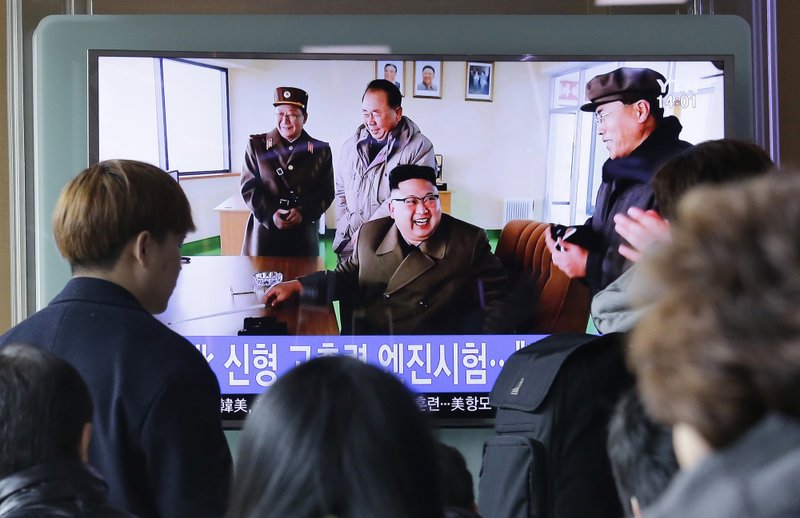TOKYO -- North Korea has conducted a ground test of a new type of high-thrust rocket engine that leader Kim Jong Un is calling a revolutionary breakthrough for the country's space program, the North's state media said Sunday.
Kim attended Saturday's test at the Sohae launch site, according to the Korean Central News Agency, which said the test was intended to confirm the "new type" of engine's thrust power and gauge the reliability of its control system and structural safety.
Kim called the test "a great event of historic significance" for the country's rocket industry, the news agency's report said.
He also said the "whole world will soon witness what eventful significance the great victory won today carries" and claimed the test marks what will be known as the "March 18 revolution" in the development of the country's rocket industry, the news agency said.
The report indicated that the engine is to be used for North Korea's space and satellite-launching program.
North Korea is banned by the United Nations from conducting long-range missile tests, but it claims its satellite program is for peaceful use -- a claim many in the U.S. and elsewhere believe is questionable.
North Korean officials have said that under a five-year plan, they intend to launch more Earth observation satellites and what would be the country's first geostationary communications satellite -- a major technological advance.
Getting that kind of satellite into place would likely require a more powerful engine than North Korea's previous ones. The North also claims it is trying to build a viable space program that would include a moon launch within the next 10 years.
The rocket engine that North Korea tested appeared to be powered with liquid fuel, according to Melissa Hanham, an expert at the James Martin Center for Nonproliferation Studies, rather than the solid fuel the regime's engineers have been working on recently. Liquid-fuel rockets are much easier to spot with satellites because they require more outdoor preparation.
"There is nothing about this rocket engine itself that makes me more terrified, but taken as a whole, it's pretty clear that they are trying to give us proof of their growing missile program," Hanham said.
The test was conducted as U.S. Secretary of State Rex Tillerson was in China on a swing through Asia that has focused on concerns over how to deal with North Korea's nuclear and missile programs.
There has been no indication whether Saturday's test was timed to coincide with Tillerson's visit, but North Korea has been highly critical of ongoing U.S.-South Korea war games just south of the Demilitarized Zone and often conducts some sort of high-profile operation of its own in protest.
Earlier this month, it fired four ballistic missiles into the Sea of Japan, reportedly reaching within 120 miles of Japan's shoreline. Analysts said the simultaneous firings appeared designed to outsmart the Terminal High Altitude Area Defense antimissile battery that the United States is deploying to South Korea, which would have difficulty shooting down four targets at once.
Japan, which was Tillerson's first stop before traveling to South Korea and China, hosts tens of thousands of U.S. troops.
On Saturday, China urged the administration of President Donald Trump to remain "coolheaded" over North Korea and not to turn its back on dialogue.
"No matter what happens, we have to stay committed to diplomatic means as a way to seek peaceful settlement," Chinese Foreign Minister Wang Yi said. "We hope all parties, including our friends from the United States, could size up the situation in a coolheaded and comprehensive fashion and arrive at a wise decision."
Information for this article was contributed by Eric Talmadge of The Associated Press and by Anna Fifield of The Washington Post.
A Section on 03/20/2017

